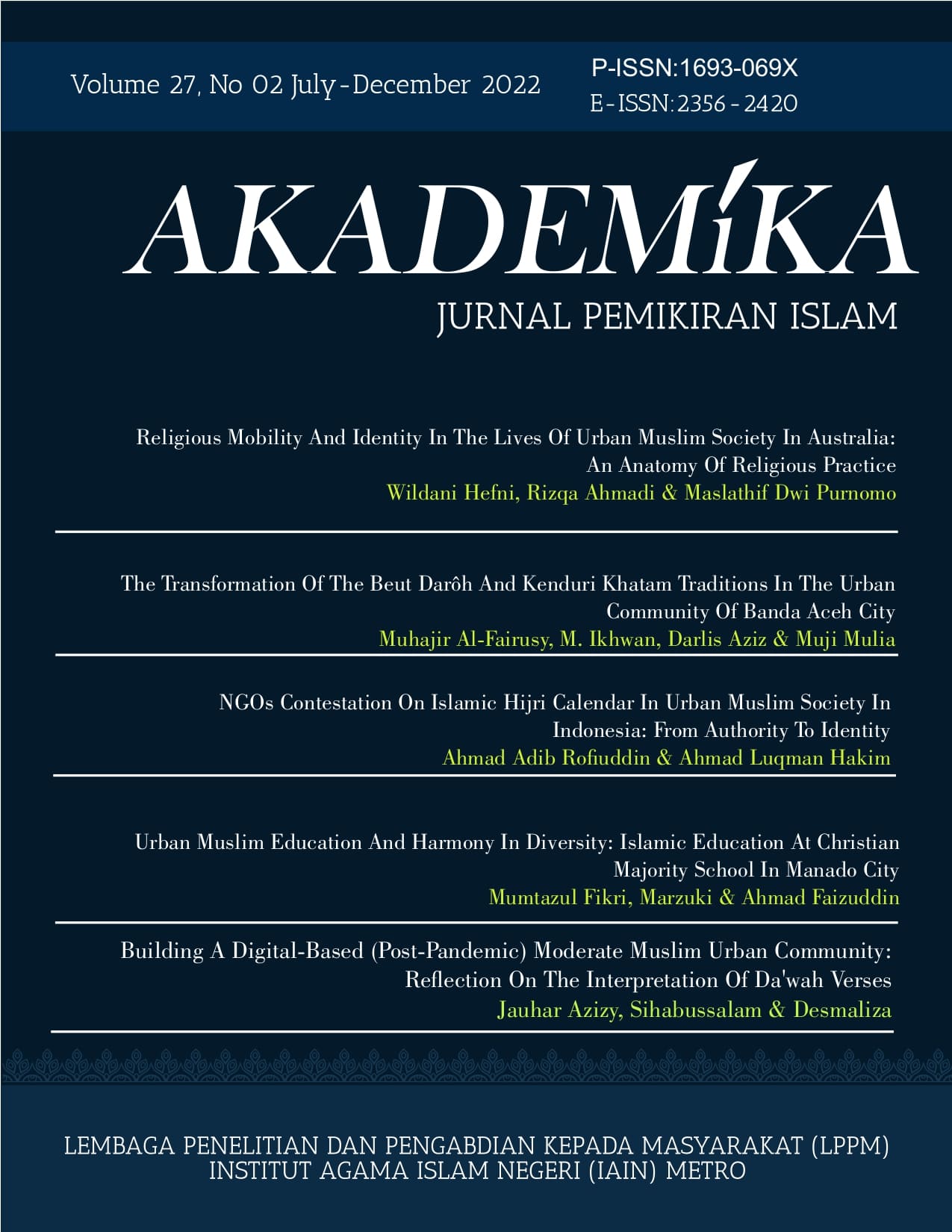THE PERCEPTION OF ISLAMIC RELIGIOUS EDUCATION AND ITS IMPLICATIONS FOR CURRICULUM DEVELOPMENT IN THE ERA OF SOCIETY 5.0
DOI:
https://doi.org/10.32332/akademika.v27i2.5805Keywords:
Curriculum Development; Islamic Religious Education; Public Perception; Society 5.0; Urban Society.Abstract
Based on the Digital Civility Index (DCI), Indonesian internet users are ranked at the lowest position within Southeast Asia in terms of their Digital Civility Index. This observable trend is closely associated with the proliferation of fake information, hate speech, cyberbullying, discriminatory behavior, and instances of fraud. Additionally, the process of modernization has significantly increased the consumptive tendencies within people's lifestyles. It is essential to note that Indonesia, with the world's largest Muslim population, is deeply rooted in religious beliefs. The country is ready to face the coming era of what is known as the era of society 5.0. Therefore, this study analyzed the public perception among urban dwellers in Semarang, focusing on the role of religious education as an aspect of curriculum development in the era of Society 5.0. In this context, the qualitative analysis was conducted using a method of phenomenology to obtain data through interviews, observations, and documentation. The results showed that contextualization of the Islamic religious education curriculum was needed to suit the needs of society. Islamic religious education taught students the physical (shari'a) and the spiritual dimensions (essential) to improve spirituality for urban Muslim communities as a basis for values in everyday behavior. In this context, the education instilled the importance of monotheism and ethics in using technology. Even though the era of Society 5.0 placed humans at the center (anthropocentric), the concept of Islamic religious education instilled the notion of God remaining at the centre (theocentric).
Downloads
References
Aziz, A. (2018). Religiusitas Masyarakat Urban di Era Digital (The Religiosity of Urban Communities in the Digital Era). International Conference Departement Communication. https://issuu.com/abdaziz9/docs/religiusitas_masyarakat_urban_di_er.
Christine Tamir, Aidan Connaughton, and A. M. S. (2022). The Global God Divide. Pew Research Center.
Creswell, J. W. (1999). Mixed-method research: Introduction and application. In Handbook of educational policy (pp. 455–472). Elsevier. https://doi.org/10.1016/B978-012174698-8/50045-X
Farikhah, F. (2014). Spiritualisasi Kurikulum di Indonesia (Telaah Filsafat Kurikulum dalam Konteks Keindonesiaan). Edukasia : Jurnal Penelitian Pendidikan Islam, 9(1). https://doi.org/10.21043/edukasia.v9i1.762.
Fitriani Lubis. (2019). Education in the Disruption Era. Britain International of Linguistics Arts and Education (BIoLAE) Journal, 1(2), 183–188. https://doi.org/10.33258/biolae.v1i2.85.
Fukuyama, M. (2018). Society 5.0: Aiming for a new human-centered society. Japan Spotlight, 27(5), 47–50. https://www.jef.or.jp/journal/pdf/220th_Special_Article_02.pdf
Gottdiener, M., Hohle, R., & King, C. (2019). The New Urban Sociology. Routledge. https://doi.org/10.4324/9780429244452.
Habibie, M. L. H., Al Kautsar, M. S., Wachidah, N. R., & Sugeng, A. (2021). Moderasi beragama dalam Pendidikan Islam di Indonesia. Moderatio: Jurnal Moderasi Beragama Dan Kebudayaan Islam, 1(1), 121–141. https://e-journal.metrouniv.ac.id/index.php/moderatio/article/view/3529.
Husserl, E. (2014). Ideas. Routledge. https://doi.org/10.4324/9781315823577.
Judge, T. A., & Robbins, S. P. (2017). Essentials of Organizational Behavior. Pearson Education (us).
Karimipour, M., Sawari, S. S. M., & Hafiz, M. M. Al. (2015). Religion , Spirituality and Mental Health : A Review of Literature. Research Journal of Commerce and Behavioural Science, 5(1), 42–47. 10.1177/070674370905400502.
Kasali, R. (2019). Disruption" Tak Ada yang Tak Bisa Diubah Sebelum Dihadapi Motivasi Saja Tidak Cukup". PT Gramedia Pustaka Utama.
Kemp, S. (2022). Digital 2022: Indonesia. 15 February 2022.
Kusnandar, V. B. (2022). Sebanyak 86,93% Penduduk Indonesia Beragama Islam pada 31 Desember 2021.
Langdridge, D. (2007). Phenomenological psychology: Theory, research and method. Pearson education.
Lase, D. (2019). Pendidikan di era revolusi industri 4.0. Sundermann: Jurnal Ilmiah Teologi, Pendidikan, Sains, Humaniora Dan Kebudayaan, 12(2), 28–43. https://doi.org/10.36588/sundermann.v1i1.18
Madrah, M. Y. (2022). Pendidikan Agama Islam dalam Arus Teknologi. In Teknologi Pendidikan. GEt Press.
Madrah, M. Y., & Mubarok. (2018). Netizen dalam Kampanye Pilpres RI 2014. Interaksi: Jurnal Komunikasi, 7(1), 16–25. https://doi.org/10.14710/interaksi.7.1.16-25.
Majid, A., Haryanto, S., Shidiq, N., Khoiri, A., & Sunarsi, D. (2018). Pengembangan Kurikulum Berbasis Pendidikan Spiritulitas dalam Kearifan Lokal di Jawa. Teknologi Pendidikan, 20(3), 280–286. https://doi.org/10.21009/jtp.v20i3.20389.
Muflihin, A., & Madrah, M. Y. (2019). Implementation of Al Ghazali’s Islamic Education Philosophy in the Modern Era. Al Fikri, 2(1), 1–23. http://dx.doi.org/10.30659/jspi.v2i1.4012.
Muflihin, A., & Makhshun, T. (2020). Peran Guru Pendidikan Agama Islam dalam Meningkatkan Literasi Digital Siswa Sebagai Kecakapan Abad 21. Ta’dibuna: Jurnal Pendidikan Agama Islam: Jurnal Pendidikan Agama Islam, 3(1), 91–103. http://dx.doi.org/10.30659/jpai.3.1.91-103.
Muna Madrah. (2013). Sosialita di Era Internet. Jurnal Ilmiah Makna, 2/3. http://dx.doi.org/10.30659/jikm.2.2.194-199.
Pihar, A. (2022). Modernisasi Pendidikan Agama Islam di Era Society 5.0. Book Chapter of Proceedings Journey-Liaison Academia and Society, 1(1), 1–12. https://j-las.lemkomindo.org/index.php/BCoPJ-LAS/article/view/1.
Sutrisman, D. (2019). Pendidikan Politik, Persepsi, Kepemimpinan, dan Mahasiswa. Guepedia.
Umro, J. (2020). Tantangan Guru Pendidikan Agama Islam Dalam Menghadapi Era Society 5.0,. Al Makrifat, 5(1). http://ejournal.kopertais4.or.id/tapalkuda/index.php/makrifat/article/view/3675/2698.
Warsiyah, W. (2018). Pembentuk Religiusitas Remaja Muslim (Tinjauan Deskriptif Analitis). Cendekia: Jurnal Kependidikan Dan Kemasyarakatan, 16(1), 19. https://doi.org/10.21154/cendekia.v16i1.1262.
Wawancara Agustus 2022. (2022). Wawancara : Urban Parents di Semarang.
Wawancara dengan Sekretaris Dinas Pendidikan Kota Semarang. (2022).
Werner, H., & Wapner, S. (1952). Toward a general theory of perception. Psychological Review, 59(4), 324–338. https://doi.org/10.1037/h0059673.
Zaman, S. (2017). Pola Konsumtif Masyarakat Urban dalam Perspektif Semiotik dan Budaya. Paradigma, Jurnal Kajian Budaya, 7(1), 40. https://doi.org/10.17510/paradigma.v7i1.138.
Zamhari, A., & Mustofa, I. (2020). The Popular Da'wah Movement in Urban Communities: the Role of Hadrami Scholars' Da'wah in Response to Religious Radicalism in Indonesia. Akademika : Jurnal Pemikiran Islam, 25(1), 185. https://doi.org/10.32332/akademika.v25i1.2385.







